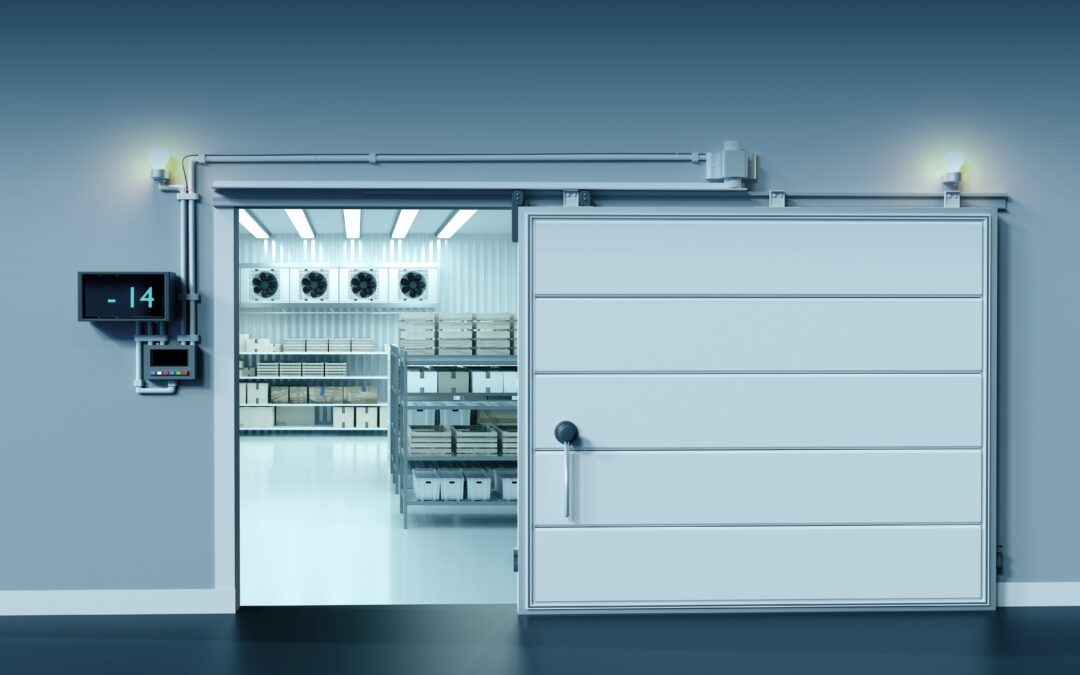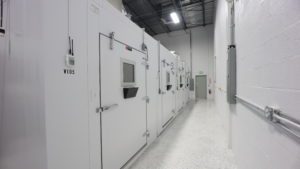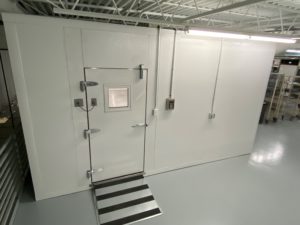Why Use a Cold Room?
Cold room storage provides precise temperature control for commercial facilities where consistent, powerful refrigeration or freezing is required. For food or chemical storage, this means long-term temperature regulation for perishable or unstable products, lowered deterioration rates, and peace of mind knowing that items are preserved in the optimal conditions.
For pharmaceuticals, the FDA indicates current best practices for the warehousing of drugs and requires them to be stored “under appropriate conditions of temperature, humidity, and light so that the identity, strength, quality, and purity of the drug products are not affected.” Cold rooms represent one of the above mentioned requirements for cold storage of these products.
Some other benefits of Parameter’s cold rooms include:
- Energy Efficiency – Reduce energy costs for storage of samples and other materials. Cold storage units are constructed to prevent fluctuations in temperature, meaning less energy is required to balance and adjust the temperature while in use. This holds true no matter your industry.
- High Product Standards – Guarantee potency of vaccines, drugs, and other sensitive items with cold storage. This can also help improve your company’s reputation and reliability.
- Safety and Security – Medications and medical equipment are highly sensitive and expensive — ensure their safekeeping with locked, weather-proof cold storage units.
Cold storage rooms are also used in transportation of industrial materials and other temperature-sensitive products across industries. In this case, the container has a cooling unit installed to ensure optimal temperature control. Refrigerated rooms, in general, are valued for their precision and power and can maintain specific temperatures over long periods of time.
How Does Cold Room Storage Work?
The design behind cold rooms that allows them to function efficiently isn’t so different from any other refrigeration system. Cold rooms use a compressor, condenser, fans, and an evaporator to maintain temperature within the unit. After a gas refrigerant gets compressed in the compressor it expands, and the gas absorbs energy. The hot gas flowing from the compressor passes over the evaporator coils and, after liquifying under high pressure, this cools the evaporator coils and the surrounding air. In order to maintain temperature, cold rooms must also be efficiently insulated.
Advance Your Products with Our Precision Cold Rooms
Delve into the world of our advanced cold rooms and freezers designed for critical temperature regulation. Experience unmatched environmental control for your storage needs.
What Is The Temperature Range of a Cold Room?
Most cold rooms will be able to accommodate temperatures between -2°C and 10°C. As for the specific temperature range of a cold room, that depends on what’s being stored inside. For food items such as fresh produce, an ideal cold room temperature ranges between 2 and 8 degrees Celsius. Pharmaceutical ICH storage will require a 5°C with a tolerance of ±3°C. When colder conditions are required, freezer rooms will be the preferred option, able to tune down to -30°C for storage of pharmaceutical products or chemicals. Freezers are also able to provide ultra-low storage needs at -50°C to -80°C.
What Can Be Stored in a Cold Room?
As for their application, cold rooms can be used to store a variety of items across industries. The most common items include biopharmaceutical and pharmaceutical products, textiles, tobacco products, perishable foods, flowers, delicate plants, artworks, and even rare books.
Precise temperature control of certain drugs and medical devices is especially important to prevent material corruption and guarantee usage safety. Laboratory reagents, dialyzers, disinfectant solutions, sterilants, burn treatment products, and dental restorative materials, for example, are all highly temperature sensitive and require routine or consistent refrigeration to be effective. A cold storage room also can be utilized to process or slow down chemical reactions in engineering settings. And as mentioned above, if sensitive materials need to be temperature-regulated during transit, cold rooms can help there too.
Final Thoughts
At PGC, our refrigerated rooms are compatible with FDA regulations and available in a variety of sizes depending on your specific industry needs. Temperature stability control is sometimes required on a larger scale, or to different specifications than standard cold room chambers can accommodate. In this case, we offer custom testing and walk-in rooms custom-built and designed to the parameters indicated. Contact us today for more sales and product information or for help with current services.
Join the growing list of Parameter clients.
Please provide us with some basic information about your needs, and we’ll contact you to begin the quoting process.
If you’d rather start the conversation over the phone or by email, contact our sales department at 828-669-8717 or sales@humiditycontrol.com.



